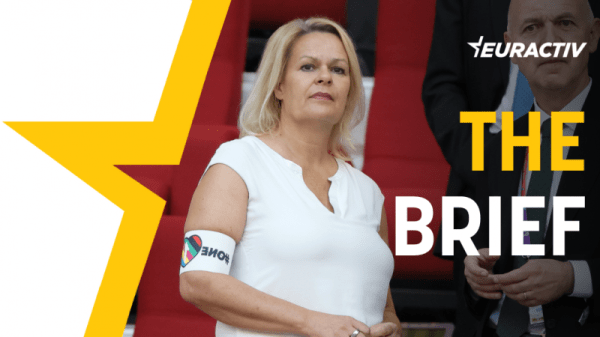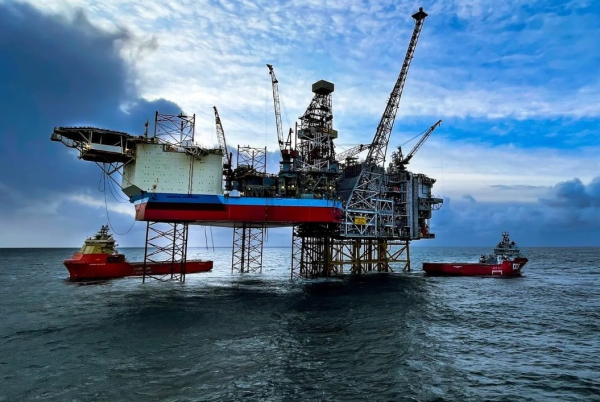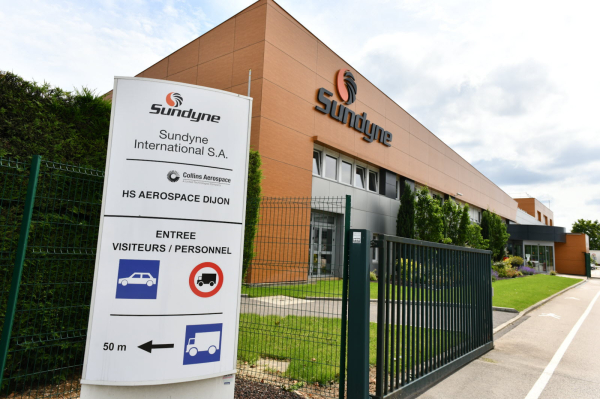
Values are always thought to be at the centre of Berlin’s policies – in theory, at least. But as we look back, the first year of the new German government has been a “double-whammy” of double standards.
Few large countries laud their commitment to liberal values like democracy, human rights and the rule of law as much as the world’s fourth-largest economy does.
“We want to increase the strategic sovereignty of the European Union by making our foreign, security, development and trade policies value-based and based on common European interests,” reads the founding treaty of the incoming government from November 2021.
Ukraine quickly felt what the new value-based German government policy amounted to. As more than 100,000 Russian soldiers amassed at their borders and an invasion was imminent, Berlin saw it fit to equip Ukraine with 5,000 helmets while blocking the Baltic states from sending Soviet-era artillery.
Lest we forget, as Russian soldiers were camped out miles from the border, leading German politicians continued to fiercely defend Nord Stream 2 pipeline from Russia throughout January 2022 – a pipeline designed to bypass Ukraine, deprive the country of gas transit income and further increase Germany’s dependence on the Kremlin.
One “should not drag Nord Stream 2 into this conflict”, explained Defence Minister Christine Lambrecht at the time.
When Chancellor Olaf Scholz noted a Zeitenwende following Russia’s invasion, the world hoped that Germany had finally recognised the sign of the times. Yet, as thousands of Ukrainian soldiers lay dead, German battle tanks – the big cats: Leopards and Pumas – have yet to be provided to Kyiv.
Even leaving military hardware aside, Germany’s value-based policies met tough energy realpolitik in the fight over what parts of the Russian economy the EU should sanction. In spring, Polish and Lithuanian heads of state had to travel to Berlin to get the government on board with banning Russian banks from the global wiring scheme SWIFT.
But Kyiv was scarcely the only country to experience bewilderment in the face of German hypocrisy.
Berlin, quick to laud the importance and rich history of Franco-German cooperation, sprang its contentious €200 billion “double-whammy” on Paris without so much as a peep, adding to existing fractures over energy and defence policy differences.
When Russia began turning off the gas tap, Berlin handed its energy companies €15 billion to go on a gas shopping spree – resulting in an unprecedented spike in gas prices. In August, Germany’s panicked buying to fill its gas stores sent the price to a level twenty times higher than in January 2021.
German hypocrisy can also be seen in more mundane affairs. For years, German media denounced the football World Cup held in Qatar. Thousands of migrant workers were said to have died in the pre-tournament building programme after the event was awarded to the Gulf state.
Media investigations unveiled blatant corruption, but it became abundantly clear that the Qatari government was openly hostile to the LGBTQI+ community, a stance anathema to the progressive ideals of the new German government.
The German team captain, known to don a rainbow flag armband, was first forced to swap it for a nonsensical “One Love” version – before abandoning it altogether for fear of losing points in the group stage.
In a typical bout of German-ness, Interior Minister Nancy Faeser donned the armband on the VIP seats during her trip to Qatar.
Perhaps Germany’s stunning failure to do well at the World Cup reflects the impacts of its “holier than thou” approach best: It feels good to say, but in practice, it rarely makes a difference. Good football won the World Cup, not virtue signalling.
Maybe Germany is not special after all. It would do Berlin good to recognise that it is no different from any other country and act accordingly.
The Roundup
While Islamophobia and anti-Muslim sentiment keeps growing across the EU, lawmakers have called on the European Commission to quickly appoint the EU coordinator to fight anti-Muslim hatred and step up efforts to tackle discrimination across the Union.
As the EU struggles to find ways to pay for industry transition towards a carbon-free economy, the finances of local governments play an often-neglected role in delivering the needed investments, argues a report by the Council of European Municipalities and Regions (CEMR).
French Energy Transition Minister Agnès Pannier-Runacher slammed her German counterpart for his “hypocritical” stance on nuclear-powered hydrogen at an EU energy ministers’ meeting on Monday (19 December), after both countries agreed to maintain “tech neutrality” on the matter just a month ago.
European countries collectively reduced their gas consumption by 20.1% compared to the average of the same months between 2017 and 2021, according to figures released on Tuesday (20 December) by Eurostat, the EU’s statistics body.
And, last but not least, the last edition of the Transport Brief in 2022: Spectre of the Yellow Vests haunts carbon tariff agreement.
Look out for…
- Commission Vice President Valdis Dombrovskis holds videoconference with Swedish Finance Minister Elisabeth Svantesson.
- College of Commissioners.
Views are the author’s.
[Edited by Zoran Radosavljevic/Alice Taylor]
Source: euractiv.com



